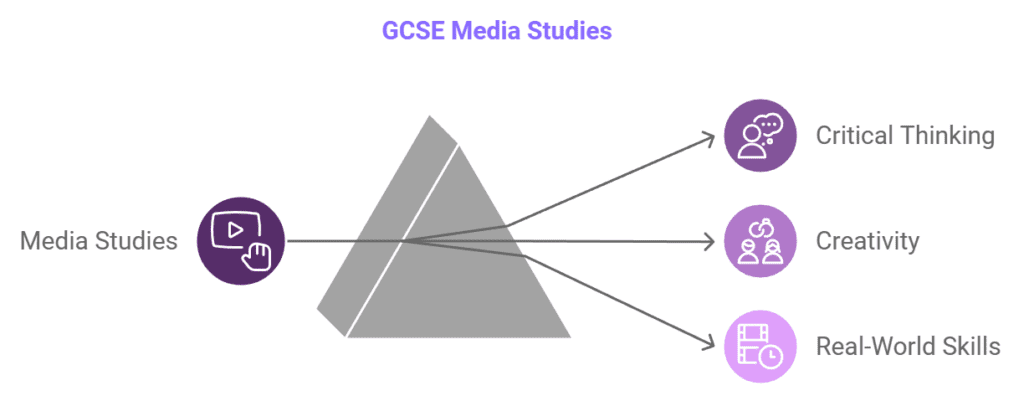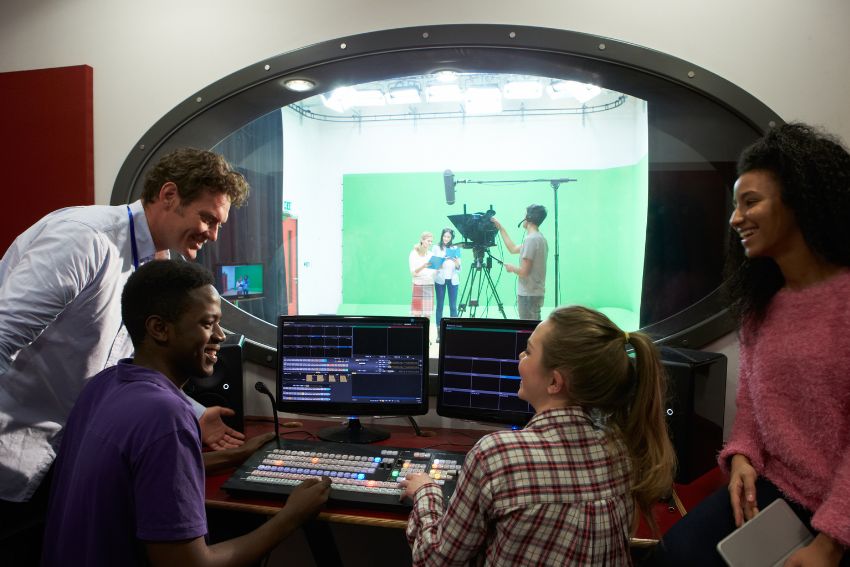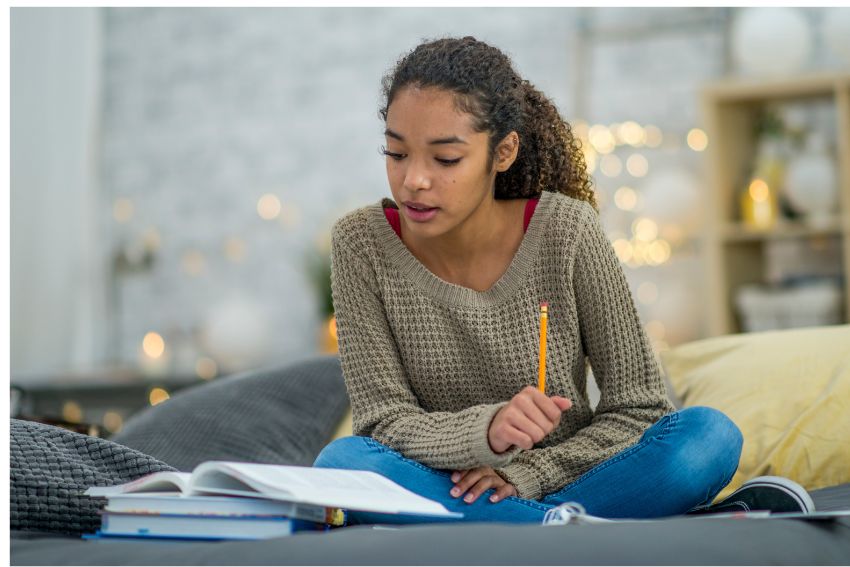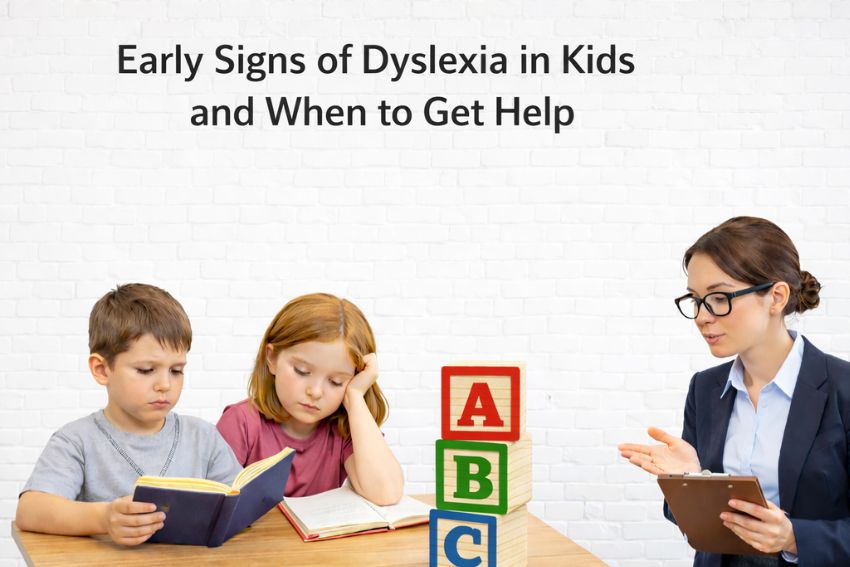Media Studies GCSE – Everything You Need To Know
As you already know, GCSE Media Studies is a pivotal stage in a student’s education, especially for those interested in creative, digital, or media-related careers, equipping them with knowledge and skills that form the foundation for further studies and future pathways. It is not only in high demand but also provides students with the tools to understand and analyse the media-rich environment we live in.
In an era where media influences every aspect of society, from politics to culture, studying Media Studies empowers students to think critically, communicate effectively, and even create media products themselves. This guide provides a detailed overview of Media Studies GCSE, helping students and parents understand its significance, explore its content, gain knowledge about exam board, revision tips and recognize how it can shape future opportunities. So If you want to know more, you are in the right place!
What is Media Studies?
Media Studies is a subject that explores the role of media in shaping society, culture, and individual perceptions. It involves the study of various media forms, such as film, television, advertising, newspapers, magazines, video games, and online platforms.
What Students Learn from Media Studies GCSE?
- Critical Analysis: Understand how you can construct media messages and how they impact audiences.
- Cultural Awareness: Exploring how media reflects and shapes social values, identities, and ideologies.
- Practical Skills: Learning how to create media products using tools like graphic design software, video editing, and photography.

Aims and Objectives Of Media Studies GCSE
The key aims are:
- To develop students’ ability to critically analyse media texts and understand how they communicate meaning.
- exploring the relationship between media, society, and culture.
- To provide students with practical skills for media production.
- To encourage creativity, problem-solving, and communication through hands-on projects.
Prior Learning and Progression
- Prior Learning: Students don’t require any specific prior knowledge, making it accessible to all students. However, a keen interest in media and technology is beneficial.
- Progression: Media Studies GCSE can lead to further studies in media, journalism, advertising, and communications. It also develops transferable skills valuable in any career, such as critical thinking and digital literacy.
What Is A Subject Content For Media Studies GCSE?
Media Studies GCSE equips students with the skills and knowledge to navigate the ever-evolving media landscape. Whether it’s decoding messages in advertisements, creating content for digital platforms, or understanding the societal impact of media, this subject prepares students for both academic and professional success in a media-centric world. Here is a list of subject for media studies:
1. Exploring the Media
This component introduces students to a wide range of media texts, helping them understand how others create media products to target specific audiences. Students learn to:
- Analyse the language, symbols, and imagery used in media texts.
- Examine representation in media, such as how gender, ethnicity, and age are portrayed.
- Understand the influence of historical, cultural, and economic contexts on media products.
2. Understanding Media Forms and Products
Students delve deeper into specific media industries, exploring how different forms of media are produced, distributed, and consumed. Key areas include:
- Media Language: How technical elements (e.g., lighting, camera angles, editing) communicate meaning.
- Industries: The role of organisations in producing and regulating media content.
- Audiences: How media caters to diverse groups and shapes their perceptions.
3. How To create Product
A significant part of Media Studies involves practical work, where students create their own media products. This hands-on experience is vital for developing creativity and technical skills.
- Planning and Research: Students begin by researching their target audience and planning their product, such as a magazine cover, short film, or social media campaign.
- Production: Using digital tools and creative techniques, students produce their media product, applying what they’ve learned about media language and audience engagement.
- Evaluation: Reflecting on their work to understand its effectiveness and how it could be improved.
What are media forms and products?

It offers students a comprehensive exploration of various media forms, enabling them to understand and critically analyse the media’s role in society. The subject content is structured to provide both theoretical knowledge and practical skills across multiple media platforms.
Media Forms Include:
- Advertising and Marketing: Students examine how advertisements and marketing campaigns are crafted to influence consumer behaviour. This includes analysing visual and textual elements, target audience strategies, and the ethical considerations involved in advertising.
- Film: The study of film encompasses understanding narrative structures, genre conventions, and the technical aspects of filmmaking such as cinematography, editing, and sound. Students also explore the film industry’s economic and cultural impact.
- Magazines: This area focuses on the design, content, and audience engagement strategies of magazines. Students analyse how magazines cater to specific demographics and reflect societal trends and issues.
- Music Video and Online, Social, and Participatory Media: Through a single music topic, students explore the production and consumption of music videos and their dissemination via online platforms and social media. This includes studying fan cultures and the participatory nature of modern media consumption.
- Newspapers: Students investigate the role of newspapers in shaping public opinion, including the analysis of news values, editorial choices, and the impact of digital transformation on print journalism.
- Radio: The study of radio covers its historical development, programming formats, audience targeting, and the adaptation of radio in the digital age.
- Television: This includes analysing television genres, narrative techniques, audience reception, and the influence of television on culture and society.
- Video Games: Students explore the design, narrative structures, and interactive elements of video games, as well as their cultural significance and the debates surrounding gaming.
Media Products and Contexts:
In addition to theoretical analysis, students engage in the creation of media products, applying their understanding of media language, representation, and audience engagement. This practical component allows students to experience the production processes and challenges faced by media professionals.
Understanding the context in which media products are produced and consumed is crucial. This includes examining historical, cultural, economic, and political factors that influence media content and its reception. By situating media texts within their broader contexts, students gain a deeper appreciation of the media’s role in reflecting and shaping societal values and ideologies.
Overall, the Media Studies GCSE curriculum equips students with critical thinking skills and practical experience, preparing them for further education and careers in the media industry.
Key Areas Of Media Studies
| Key Area | What Students Learn | Examples |
| Media Language | How media communicates meaning through visuals, technical elements, and symbols. | Analysing camera angles, lighting, colour schemes, editing styles, and sound in a film or advert. |
| Representation | How individuals, groups, and issues are portrayed in media, including stereotypes and biases. | Examining how gender, ethnicity, and age are represented in magazines or TV shows and their societal impact. |
| Media Audiences | How different audiences consume and interpret media based on personal and cultural factors. | Exploring how adverts target specific demographics using language, imagery, and tone. |
| Media Industries | Understanding the processes behind media production, distribution, and regulation. | Learning about the role of organisations like Netflix or BBC, and how budget and advertising influence media. |
| Contexts of Media | How historical, cultural, and social factors shape media content and its reception. | Discussing how a film reflects societal values of its time or how technology influences social media trends. |
| Practical Skills | Planning, creating, and evaluating media products, such as designing a magazine or filming a short video. | Using tools like Canva or Photoshop to design a magazine cover or editing software to produce a video clip. |
What Do You Need To Know About Media Studies GCSE Exams?
Media Studies GCSE is offered by several UK exam boards, including AQA, Eduqas, OCR, and WJEC. Each board follows a slightly different format, but the overall goal is the same: to test students’ understanding of media concepts, their ability to critically analyse media texts, and their practical media production skills.
Exam Boards and Their Specifications

Media Studies GCSE is offered by several exam boards in the UK, including AQA, Eduqas, OCR, and WJEC. While the core goals are the same to test students’ understanding of media concepts, analysis skills, and creativity, the structure and focus of each board can vary slightly. Here’s a quick breakdown of what each exam board offers:
AQA
- The course includes two written exams and a creative project.
- Paper 1 focuses on media language, representation, industries, and audiences.
- Paper 2 takes a closer look at specific media forms like television, newspapers, and online media.
- Students also complete a Non-Exam Assessment (NEA), where they produce a media product based on a set brief.
- Marks are split: 70% exams, 30% creative project.
Eduqas
- This course is similar to AQA but has a slightly different focus.
- Component 1 covers media language, representation, and industries.
- Component 2 focuses on set media forms like film, advertising, and music videos.
- The Component 3 NEA allows students to create their own media product.
- Like AQA, marks are divided into 70% exams and 30% creative work.
OCR
- Students sit one written exam that tests their understanding of media theory and analysis across various forms.
- They also complete a media production project, where they create a product aligned with a brief.
- Marks are distributed the same way: 70% for the written exam and 30% for the creative coursework.
WJEC
- This course closely follows the Eduqas structure, with set texts and assessments focusing on similar media forms.
- It includes two written components and a practical project, also split 70% exams and 30% NEA.
Each exam board offers a balance of theoretical knowledge and practical experience, giving students a chance to develop both analytical and creative skills. While the details may vary slightly, all the courses aim to prepare students to engage critically with the media and produce high-quality work.
Exam Format
The Media Study exam typically consists of:
- Written Papers:
- Short Answer Questions: Test basic understanding of media terminology and concepts.
- Extended Response Questions: Require critical analysis of unseen media texts or set texts studied during the course.
- Case Studies: Based on pre-selected media forms like magazines, television, or video games.
- Non-Exam Assessment (NEA):
- Students create a media product, such as a magazine cover, film clip, or website, based on a brief provided by the exam board.
- This practical component assesses creativity, planning, and technical skills.
How Marks Are Distributed For Media Studies GCSE
- Exams: Typically account for 70% of the overall grade, with marks awarded for:
- Media Analysis: Breaking down how media texts convey meaning.
- Representation: Discussing how individuals and groups are portrayed in media.
- Use of Theories: Applying media theories to examples.
- Contextual Understanding: Linking media texts to their cultural, historical, and social contexts.
- Non-Exam Assessment (NEA): Usually 30% of the grade. Marks are awarded for:
- Research and Planning: Understanding the target audience and creating a concept.
- Production Quality: Using media language effectively in the final product.
- Evaluation: Reflecting on the work and its effectiveness.
What You Need to Pay Attention To
- Know the Set Texts:
- Each exam board specifies media texts students must study (e.g., a specific TV show, magazine, or film). Understanding these texts in depth is crucial.
- Practise Analysing Unseen Media:
- Students should be prepared to apply their knowledge to unfamiliar media products during the exam.
- Master Media Theories:
- The ability to use theories like Propp’s Narrative Theory or Hall’s Encoding/Decoding Model can significantly boost marks.
- Balance Creativity and Technical Skills in NEA:
- Ensure that media production projects align with the brief and demonstrate technical competence and originality.
- Time Management in Exams:
- Practice answering questions within the allocated time to ensure all sections are completed.
The Media Studies GCSE exams challenge students’ analytical and creative abilities. Students maximise their potential and achieve great results when they focus on the exam format, understand how marks are distributed, and practise key skills like media analysis and production.
Tips for Revision

Revising for Media Studies GCSE doesn’t have to feel overwhelming. It’s all about understanding how the media works, analysing it critically, and applying your knowledge creatively. Here are some practical and straightforward tips to help you prepare effectively for your exams.
Know What the Exam Wants
Start by getting familiar with your exam board’s specification. Make sure you know the key topics, media forms, and how marks are awarded. Pay extra attention to the set texts you need to study and understand the balance between theory and practical work. Knowing what the examiners are looking for is half the battle!
Get Comfortable with Media Language
Media has its own “language,” and learning it is essential. Take time to understand key terms like mise-en-scène, editing, camera angles, and sound. Practice applying these terms by analysing real-life media, such as a film scene or an advert. Ask yourself: How do these elements create meaning or influence the audience?
Dive into Representation
Think about how people and issues are portrayed in the media. For example, how are gender, age, or ethnicity represented in adverts, films, or TV shows? Look out for stereotypes and think about whether the media is reinforcing or challenging them. Be prepared to explain why representation matters and how it impacts audiences.
Understand Media Forms and Products
Make sure you’ve covered all the media forms in your syllabus, such as advertising, magazines, TV, and video games. Focus on understanding how these products are made, who they’re made for, and how they reach their audience. Knowing how the media works behind the scenes will give your answers an edge.
Revise Media Theories
- Familiarise yourself with key media theories, such as:
- Uses and Gratifications Theory: How audiences engage with media for specific purposes (e.g., entertainment, information).
- Propp’s Narrative Theory: Roles like the hero, villain, and helper in storytelling.
- Hall’s Encoding/Decoding Model: How audiences interpret media messages differently.
- Practice applying these theories to real-life examples.
Practise Making Media
If your course includes media production, use it as a chance to be creative. Whether it’s designing a magazine cover or planning a social media campaign, think about your audience, the message you want to send, and how you’ll grab their attention. Practising with tools like Canva or basic video editing software can really help.
Contextual Understanding
- Learn how historical, cultural, social, and political factors influence media production.
- Relate your set texts to their broader contexts, such as societal trends or technological advancements.
Use Past Papers
Past papers are a goldmine. They help you get used to the types of questions you’ll face and how to structure your answers. Time yourself to practice working under exam conditions, and don’t forget to check the mark schemes to see what examiners are looking for.
Edexel GCSE Media Studies Past Papers
AQA GCSE Media Studies Past Papers
OCR Media Studies GCSE Past Papers
WJEC GCSE Media Studies Past Papers
Stay Up-to-Date with Media Trends
Media is constantly changing, so it’s worth keeping an eye on current trends. Look at how social media campaigns work or how new films are marketed. This knowledge can make your answers feel more relevant and fresh.
Make Revision Fun and Organised
Revision doesn’t have to be boring! Use flashcards to learn key terms, create mind maps to connect ideas, or watch YouTube videos for quick explanations. Set up a revision timetable so you can cover everything without last-minute cramming.
Conclusion
Media Studies GCSE is a dynamic and rewarding subject that equips students with essential skills to navigate and critically analyse the media-rich world we live in. Moreover, it provides opportunities to explore media language and representation, delve into media industries, and create innovative projects. By mastering a blend of analytical and practical expertise, students not only prepare themselves for exams but also open doors to further studies and exciting careers in media, journalism, advertising, and beyond.
That said, succeeding in this subject requires more than just interest in the subject. To excel, students need a clear understanding of key concepts, confidence in analysing both set and unseen texts, and strong practical skills. Furthermore, this is where Online GCSE Tutors can play a transformative role. With personalised guidance, tutors can break down complex topics, provide targeted feedback on media production tasks, and share effective revision strategies. Whether you are mastering media theories, refining your NEA project, or practising exam techniques, having the right support can make a significant difference.
As you progress through Media Studies, it is important to balance your time wisely between theoretical knowledge and practical application. Additionally, seeking regular feedback and using available resources to your advantage will further enhance your understanding. With dedication, careful planning, and the right support—including help from online tutors—you can confidently achieve success in your Media Studies GCSE and beyond!
FAQ’s For Media Studies GCSE
Media Studies GCSE hard
Media Studies GCSE is not inherently hard, but it does require a mix of analytical thinking and creativity. Students need to understand media concepts, analyse texts, and create their own media products. Therefore, if you’re willing to engage with the subject, it can be enjoyable and manageable. For those needing extra guidance, online tutors can provide support with difficult theories, exam techniques, and practical projects.
How long does the Media Studies exam last?
The length of the Media Studies exam depends on the exam board, but typically each paper lasts 1 hour 30 minutes to 2 hours. Most GCSE Media Studies courses include two written exams and a non-exam assessment (NEA), so it’s essential to plan your time effectively during revision.
How many papers are there in GCSE Media Studies?
Most GCSE Media Studies courses have two written papers. These exams test your knowledge of media language, representation, industries, and audiences, as well as your ability to analyse set texts and unseen media products. In addition to the exams, there’s a practical non-exam assessment (NEA) where you create a media product based on a brief.
What jobs can I get with Media Studies?
Media Studies opens doors to a variety of careers, including:
- Journalism: Writing for newspapers, magazines, or online platforms.
- Advertising and Marketing: Creating campaigns to promote brands and products.
- Film and Television: Roles in production, editing, or scriptwriting.
- Social Media Management: Managing online presence for businesses or individuals.
- Public Relations: Building and maintaining a company or individual’s public image.
With further study, Media Studies can also lead to careers in digital content creation, graphic design, or even teaching. The subject develops transferable skills like critical thinking and communication, which are valuable in any profession.
Other Articles You May Be Interested in:
What Are The Hardest GCSE Subjects?
Navigating Year 10: Setting Goals and Preparing for GCSEs
GCSE Grade Boundaries Explained








